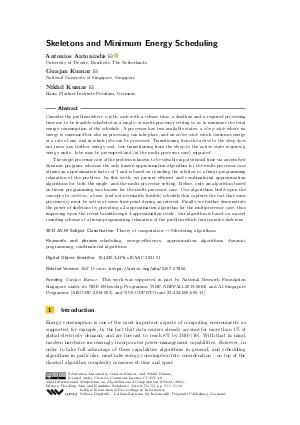Skeletons and Minimum Energy Scheduling
Authors
Antonios Antoniadis  ,
Gunjan Kumar,
Nikhil Kumar
,
Gunjan Kumar,
Nikhil Kumar
-
Part of:
Volume:
32nd International Symposium on Algorithms and Computation (ISAAC 2021)
Part of: Series: Leibniz International Proceedings in Informatics (LIPIcs)
Part of: Conference: International Symposium on Algorithms and Computation (ISAAC) - License:
 Creative Commons Attribution 4.0 International license
Creative Commons Attribution 4.0 International license
- Publication Date: 2021-11-30
File

PDF
LIPIcs.ISAAC.2021.51.pdf
- Filesize: 0.77 MB
- 16 pages
Document Identifiers
Related Versions
- Full Version https://arxiv.org/abs/2107.07800
Subject Classification
ACM Subject Classification
- Theory of computation → Scheduling algorithms
Keywords
- scheduling
- energy-efficiency
- approximation algorithms
- dynamic programming
- combinatorial algorithms
Metrics
- Access Statistics
-
Total Accesses (updated on a weekly basis)
0Document
0Metadata
Abstract
Consider the problem where n jobs, each with a release time, a deadline and a required processing time are to be feasibly scheduled in a single- or multi-processor setting so as to minimize the total energy consumption of the schedule. A processor has two available states: a sleep state where no energy is consumed but also no processing can take place, and an active state which consumes energy at a rate of one, and in which jobs can be processed. Transitioning from the active to the sleep does not incur any further energy cost, but transitioning from the sleep to the active state requires q energy units. Jobs may be preempted and (in the multi-processor case) migrated. The single-processor case of the problem is known to be solvable in polynomial time via an involved dynamic program, whereas the only known approximation algorithm for the multi-processor case attains an approximation factor of 3 and is based on rounding the solution to a linear programming relaxation of the problem. In this work, we present efficient and combinatorial approximation algorithms for both the single- and the multi-processor setting. Before, only an algorithm based on linear programming was known for the multi-processor case. Our algorithms build upon the concept of a skeleton, a basic (and not necessarily feasible) schedule that captures the fact that some processor(s) must be active at some time point during an interval. Finally, we further demonstrate the power of skeletons by providing a 2-approximation algorithm for the multiprocessor case, thus improving upon the recent breakthrough 3-approximation result. Our algorithm is based on a novel rounding scheme of a linear-programming relaxation of the problem which incorporates skeletons.
Cite As Get BibTex
Antonios Antoniadis, Gunjan Kumar, and Nikhil Kumar. Skeletons and Minimum Energy Scheduling. In 32nd International Symposium on Algorithms and Computation (ISAAC 2021). Leibniz International Proceedings in Informatics (LIPIcs), Volume 212, pp. 51:1-51:16, Schloss Dagstuhl – Leibniz-Zentrum für Informatik (2021)
https://doi.org/10.4230/LIPIcs.ISAAC.2021.51
BibTex
@InProceedings{antoniadis_et_al:LIPIcs.ISAAC.2021.51,
author = {Antoniadis, Antonios and Kumar, Gunjan and Kumar, Nikhil},
title = {{Skeletons and Minimum Energy Scheduling}},
booktitle = {32nd International Symposium on Algorithms and Computation (ISAAC 2021)},
pages = {51:1--51:16},
series = {Leibniz International Proceedings in Informatics (LIPIcs)},
ISBN = {978-3-95977-214-3},
ISSN = {1868-8969},
year = {2021},
volume = {212},
editor = {Ahn, Hee-Kap and Sadakane, Kunihiko},
publisher = {Schloss Dagstuhl -- Leibniz-Zentrum f{\"u}r Informatik},
address = {Dagstuhl, Germany},
URL = {https://drops.dagstuhl.de/entities/document/10.4230/LIPIcs.ISAAC.2021.51},
URN = {urn:nbn:de:0030-drops-154849},
doi = {10.4230/LIPIcs.ISAAC.2021.51},
annote = {Keywords: scheduling, energy-efficiency, approximation algorithms, dynamic programming, combinatorial algorithms}
}
Author Details
Funding
- Kumar, Gunjan: This work was supported in part by National Research Foundation Singapore under its NRF Fellowship Programme [NRF-NRFFAI1-2019-0004] and AI Singapore Programme [AISG-RP-2018-005], and NUS ODPRT Grant [R-252-000-685-13].
References
-
Susanne Albers and Antonios Antoniadis. Race to idle: New algorithms for speed scaling with a sleep state. ACM Trans. Algorithms, 10(2):9:1-9:31, 2014.

-
Antonios Antoniadis, Naveen Garg, Gunjan Kumar, and Nikhil Kumar. Parallel machine scheduling to minimize energy consumption. In SODA, pages 2758-2769. SIAM, 2020.

-
Antonios Antoniadis, Chien-Chung Huang, and Sebastian Ott. A fully polynomial-time approximation scheme for speed scaling with sleep state. In Proceedings of the Twenty-Sixth Annual ACM-SIAM Symposium on Discrete Algorithms, SODA 2015, San Diego, CA, USA, January 4-6, 2015, pages 1102-1113, 2015.

-
Philippe Baptiste. Scheduling unit tasks to minimize the number of idle periods: a polynomial time algorithm for offline dynamic power management. In Proceedings of the seventeenth annual ACM-SIAM symposium on Discrete algorithm, pages 364-367. Society for Industrial and Applied Mathematics, 2006.

-
Philippe Baptiste, Marek Chrobak, and Christoph Dürr. Polynomial-time algorithms for minimum energy scheduling. ACM Trans. Algorithms, 8(3):26:1-26:29, 2012.

-
Marek Chrobak, Uriel Feige, Mohammad Taghi Hajiaghayi, Sanjeev Khanna, Fei Li, and Seffi Naor. A greedy approximation algorithm for minimum-gap scheduling. Journal of Scheduling, 20(3):279-292, 2017.

-
Erik D. Demaine, Mohammad Ghodsi, MohammadTaghi Hajiaghayi, Amin S. Sayedi-Roshkhar, and Morteza Zadimoghaddam. Scheduling to minimize gaps and power consumption. J. Sched., 16(2):151-160, 2013.

-
Sandy Irani and Kirk Pruhs. Algorithmic problems in power management. SIGACT News, 36(2):63-76, 2005.

-
Sandy Irani, Sandeep K. Shukla, and Rajesh Gupta. Algorithms for power savings. ACM Trans. Algorithms, 3(4):41, 2007.

- Nicola Jones. How to stop data centres from gobbling up the world’s electricity. https://www.nature.com/articles/d41586-018-06610-y, 2018.
-
Gunjan Kumar and Saswata Shannigrahi. On the NP-hardness of speed scaling with sleep state. Theor. Comput. Sci., 600:1-10, 2015.

